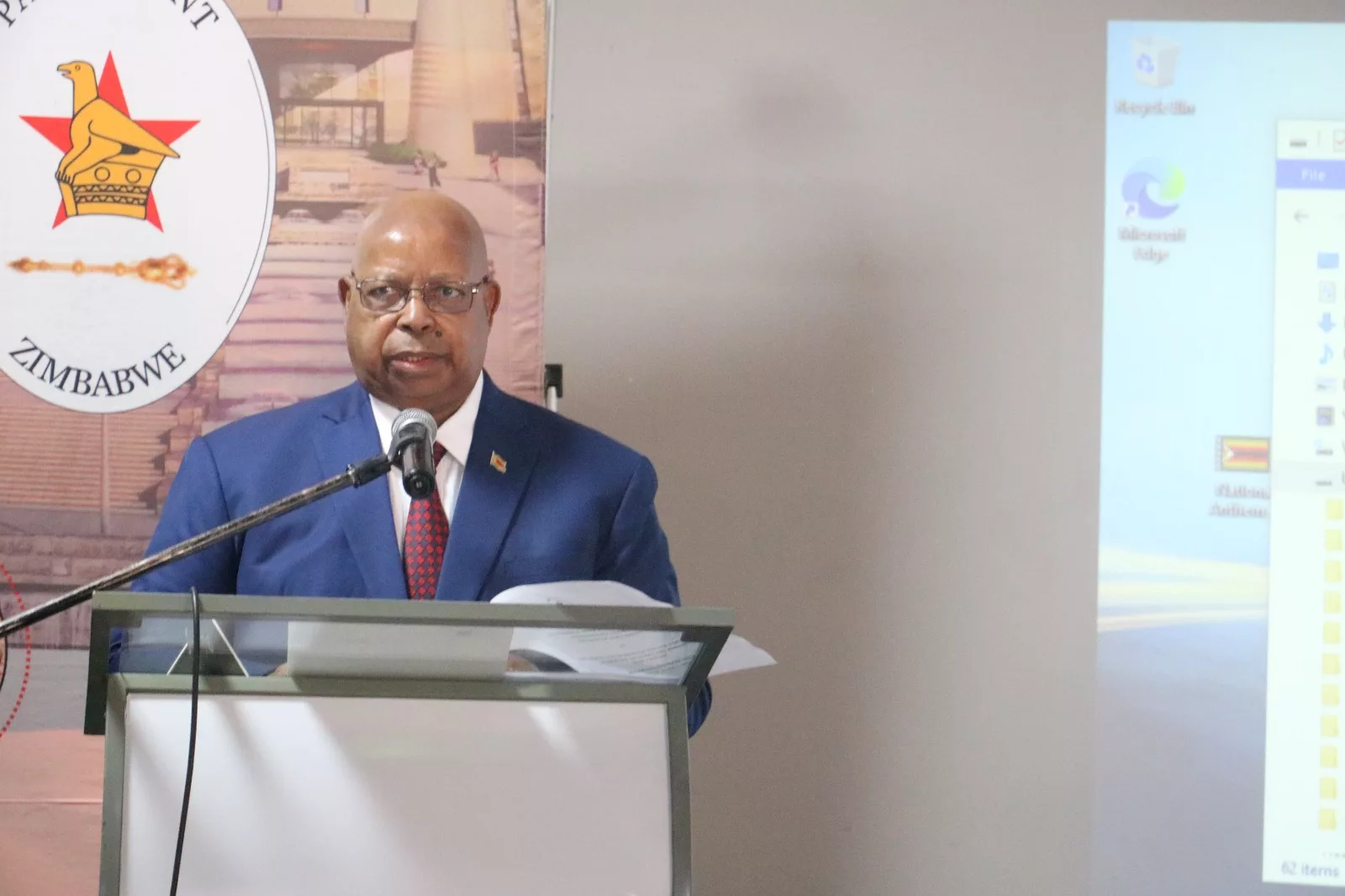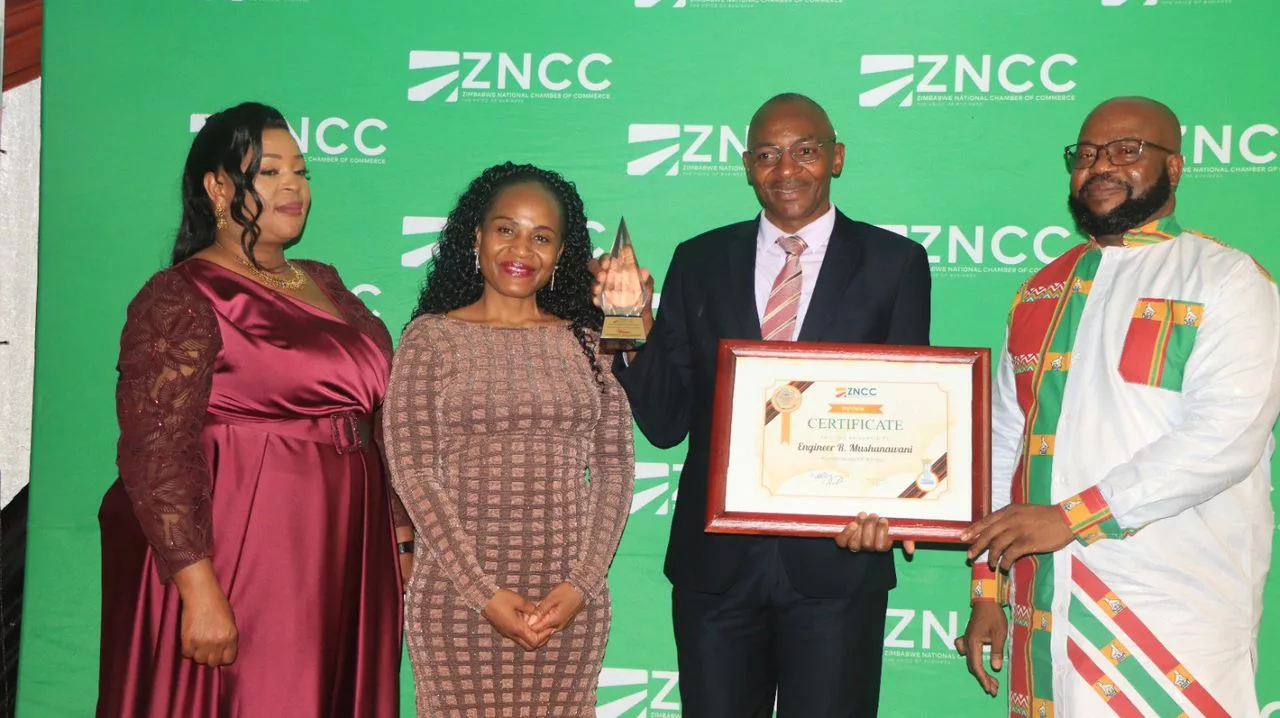|
Getting your Trinity Audio player ready...
|
Speaker of the Parliament of Zimbabwe, Hon Jacob F. N. Mudenda has urged the Parliamentary Portfolio Committee on Mines and Mining Development to play its role in ensuring the upscaling of mining productivity to enable Zimbabwe to attain greater heights of economic prosperity.
He made the call during the induction workshop for the Portfolio Committee on Mines and Mining Development that took place at the Bulawayo Rainbow Hotel yesterday.
The Committee is charged with enormous responsibilities relative to the oversight of one of the most critical sectors of the national economy – mining. Accordingly, the primary objective of this workshop was to capacitate the Committee collectively and individually so that members could effectively discharge their tripartite constitutional mandate of law-making, oversight, and representation. Integral to these seminal Committee responsibilities are the intricate obligations of the Budget appropriation and ratification of International Treaties and Agreements.
“In that context, your Committee should not be oblivious to the fact that the mining sector is estimated to contribute 8% towards our national Gross Domestic Product (GDP) while creating over 45,000 formal jobs and informal employment opportunities of approximately one million artisanal and small-scale miners. Furthermore, the mining sector accounts for 60% of the country’s export receipts.
“For this reason, your Committee is enjoined to collaborate with the Ministry of Mines and Mining Development in ensuring that innovative mining strategies are employed to upscale the mining productivity which should enable Zimbabwe to attain greater heights of economic prosperity,” Hon Mudenda said.
Section 130(1) of the Constitution entrusts the Committee with the solemn responsibility to craft laws for peace order, and good governance of Zimbabwe. This section provides a benchmark for measuring the effectiveness of the laws which must ensure an environment of peace, order and good governance across the country.
Moreover, section 117(2) outlines the legislative authority of Parliament as follows:
“(2) The legislative authority confers on the Legislature the power—
- to amend this Constitution in accordance with section 328;
- to make laws for the peace, order, and good governance of Zimbabwe; and
- to confer subordinate legislative powers upon another body or authority in accordance with section 134.
This mandate extends to the ratification, domestication, and monitoring of the implementation of international treaties and agreements as specified in section 34 as read together with section 327 of the Constitution.
The Constitution is unequivocal on the oversight role of Parliament. Specifically, section 119 provides that:
“(1) Parliament must protect this Constitution and promote democratic governance in Zimbabwe.
(2) Parliament has power to ensure that the provisions of this Constitution are upheld and that the State and all institutions and agencies of government at every level act constitutionally and in the national interest.
(3) For the purposes of subsection (2), all institutions and agencies of the State and government at every level are accountable to Parliament.”
In tandem, Standing Order No. 21 of the National Assembly Standing Orders elaborates on the above constitutional provisions of mandating Portfolio Committees to:
“(a) examine the expenditure, administration and policy of government departments and other matters falling under their jurisdictions as Parliament may, by resolution, determine;
(b) consider and deal with all bills and Statutory Instruments or other matters which are referred to it by or under a resolution of the House or by the Speaker;
(c) consider or deal with an appropriation or money Bill or any aspect of an appropriation or money Bill referred to it by these Standing Orders or by or under the resolution of this House; and
- monitor, investigate, inquire into and make recommendations relating to any aspect of the legislative programme, budget, policy or any other matter it may consider relevant to the government department falling within the category of affairs assigned to it, and may, for that purpose consult and liaise with such department;
- consider or deal with all international treaties, relevant to it, which are from time to time negotiated, entered into or agreed upon within four weeks of tabling.” Herein lies the governmental accountability barometer the Committee must measure perspicuously with its oversight lenses. During that measuring, the Committee should also be guided by Part IV of the Privileges, Immunities and Powers of Parliament Act (PIPA) [Chapter 2:08], which prescribes the handling of witnesses and evidence brought before Parliament. It is incumbent upon the Committee to ensure that a conducive environment exists for open and honest dialogue with witnesses from the Ministry and its related stakeholders. I strongly urge your Committee to disabuse the adversarial attitude while interrogating witnesses.
As part of the legislative framework for sound governance, section 107(2) of the Constitution, Standing Orders No. 26 of the National Assembly and sections 33 to 38 of the Public Finance Management Act [Chapter 22:19] collectively provide the necessary mechanisms for robust oversight over the Executive regarding the prudential management of the public purse.
In this context, Hon Mudenda said the Committee must pay particular attention to sections 33 to 38 of the Public Finance Management Act [Chapter 22:19] which enjoins Committees to demand the tabling of monthly, quarterly, and annual budget performance reports by Ministries to Parliament.
“Your Committee is, therefore, duty-bound to meticulously analyze these reports alongside annual and special audit reports tabled in the House by the Auditor General on the Ministry of Mines and Mining Development. Concomitantly, your Committee also bears the responsibility of monitoring the implementation of the recommendations of the Public Accounts Committee (PAC) on the financial performance of the Ministry of Mines and Mining Development as outlined in the Treasury Minutes issued by the Minister of Finance, Economic Development, and Investment Promotion, on behalf of the Executive.”
On the 26th of April 2024, the United Nations Secretary-General, Antonio Guterres, appointed a 38-member panel on Critical Energy Transition Minerals, in which Zimbabwe is a participant.
The creation of this Panel presents an opportunity for developing countries such as Zimbabwe to boost revenues, create jobs, and diversify their economies through partnerships with manufacturers of electric motor vehicles and storage batteries.
“Your Committee should, therefore, ensure that the Ministry of Mines and Mining Development comes up with sound policies and legislation that attract investment in the exploitation of critical energy minerals. In this regard, it urgently behoves your Committee to ensure that the long-awaited Mines and Minerals Amendment Bill is tabled before Parliament no sooner than later.
“The 20 years of delay in reviewing the mining law has exacerbated the conflict challenges being experienced by the stakeholders in the mining sector such as the:
- Non-recognition of small-scale miners as an integral part of the mining sector;
- Delays in resolving disputes over mine boundaries and ownership;
- Balancing rights between miners and other land surface users such as farmers, environmentalists, and wildlife conservancies.
- Inclusion of key stakeholders of the Mining Affairs Board, particularly those affected by mining operations such as coterminous communities;
- Sustainable environmental mining practices which should guarantee the safety and health of miners as well as the conservation of the environment.
- The non use of computerized cadastre system in the registration of mining titles; and
- Curbing of Illicit financial flows from the mining sector.
“Consequently, it is my hope that the Mines and Minerals Amendment Bill will be aligned to regional and international agreements such as the Environmental, Social and Governance (ESG) framework, the Africa Mining Vision, and the SADC Protocol on Mining. In the same vein, I urge the Ministry of Mines and Mining Development to also assiduously finalize the long overdue Minerals Development Policy which should underpin the architecture of future mining legislation,” Hon Mudemnda added.






